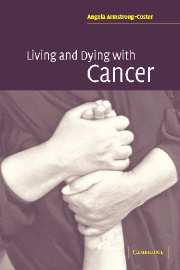5 - Stage Four – Destination
Published online by Cambridge University Press: 22 September 2009
Summary
The deaths
Thanks to the interventions of modern medical science, many individuals survive their encounter with cancer and go on to live out their lives in a full and productive way. However, the respondents you have met in this book, with one exception, were drawn from a population of individuals who had been reported to me as dying, they all volunteered to help in this research, because they felt that their contributions would help others.
These respondents lived through many, sometimes prolonged, periods of remission; during this time, many began to place their trust in this respite, hoping it would prove permanent. For the majority, when their period of remission ended, they had to face again the horror of their prognosis and, consequently, endure bouts of extreme frustration and bewilderment. This confrontation with their fears led to discussion and efforts at resolution between patients and their carers and often concerned practical issues, such as the physical site where death would occur. For some, such discussions freed them from previously internalised anxieties. Decisions, once articulated and arrived at, allowed their wishes to be met.
In agreement with Kubler-Ross (1995), all the respondents interviewed, as well as many of those patients studied during my periods of participant observation in the hospices, had, at some stage, tempered their attitudes to their imminent deaths. This change in outlook resulted in a philosophic shift away from fighting to stay alive towards an acknowledgement of their impending death.
- Type
- Chapter
- Information
- Living and Dying with Cancer , pp. 135 - 175Publisher: Cambridge University PressPrint publication year: 2004



